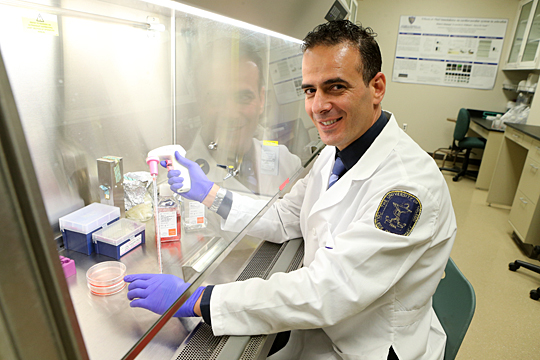One assistant professor at The University of Toledo is a step closer to solving one of the mysteries of the human body with the help of an award and some seed grant money.
Dr. Wissam AbouAlaiwi, assistant professor in the UT Department of Pharmacology and Experimental Therapeutics, recently received the New Investigator Award from the American Association for Colleges of Pharmacy. The award, worth $10,000, is given to faculty members in the early stages of their career.

Dr. Wissam AbouAlaiwi performed experiments on cells from mice and humans with polycystic kidney disease to confirm studies performed on patients.
The $10,000 will go toward funding his research on primary cilia, organelles that were originally thought to have no function, but that AbouAlaiwi and his colleagues believe play a role in cardiovascular and polycystic kidney diseases. They already have found that when the cilia are not present or not functioning, it can cause cardiovascular and developmental problems in the heart.
Though the amount of this particular award is not enough to fully fund his lab’s research, getting some data will open doors for AbouAlaiwi to earn larger grants such as those from the National Institutes of Health. He will present his initial findings at the American Association for Colleges of Pharmacy’s annual meeting in July in Nashville, Tenn.
“This is a small study, but hopefully the data that we will generate will allow us to take this project and confirm our results in animal models and, in the future, humans,” AbouAlaiwi said.
UT’s College of Pharmacy and Pharmaceutical Sciences is no stranger to the American Association for Colleges of Pharmacy; each year, a group of deans, faculty, staff and students attend the organization’s annual meeting. AbouAlaiwi also is the second faculty member who has won this award; Dr. Isaac Schiefer, UT assistant professor in the Department of Medicinal and Biological Chemistry, received it in 2014.
“It’s very good for our university and college because it raises the level of presence of our university among other top colleges of pharmacy in the United States,” AbouAlaiwi said.
AbouAlaiwi gives much of the credit for his success to his college, his department and his students. He said that Dr. Johnnie Early, dean of the College of Pharmacy and Pharmaceutical Sciences, as well as his colleagues, have supported and encouraged him to be active in organizations like the American Association for Colleges of Pharmacy.
He runs his lab with his students, whom he shares credit with for this success, saying that the research would not be possible without them.